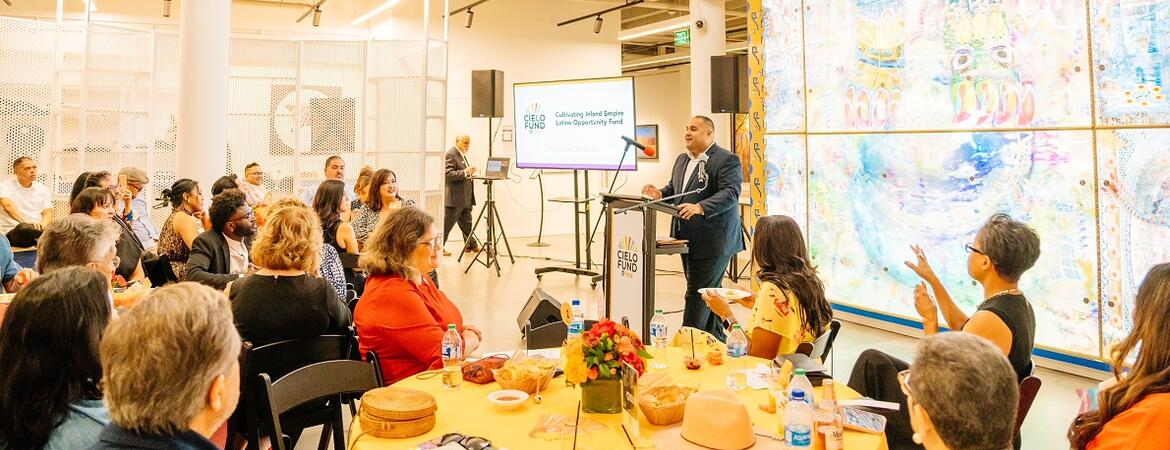
Sept. 25, the Center for Social Innovation released a report based on census data that asserts only 11% of Latinos in the Inland Empire have a bachelor’s degree or higher, compared with 35% overall in California and 33% nationally. Latinos comprise 51 percent of the 4.65 million people who live in the Inland Empire.
The report, “Aquí Estamos: A Data Profile of the Inland Empire’s Latino Community,” was conducted in partnership, and released concurrently with, the launch of the Cultivating Inland Empire Latino Opportunity, or CIELO Fund, at the Inland Empire Community Foundation (IECF). Its founder is Jesse Melgar ‘17, a UC Riverside School of Public Policy MPP graduate and the former communications director for Gov. Gavin Newsom.
Other findings from the report include:
- College graduation rates lag: Only 11% of Latinos in the region have a bachelor’s degree or higher, well below the state average of 35% and the national average of 33%.
- Income inequality: While Latino household incomes in the region have grown between 2010 and 2020 by nearly $10,000, the Latino community still lags non-Hispanic whites in the region by nearly $14,000 per year as of 2020.
- Child poverty rates: Poverty rates are also much higher among Latinos in the Inland Empire and these gaps are even more stark when it comes to child poverty. Latino children in the Inland Empire are twice as likely as white children to live in poverty.
- Access to healthcare: The proportion of Inland Latinos without health insurance in 2020 was 12% which was more than double the share among non-Hispanic white residents in the region – 5%. Latino adults in the Inland Empire were also much less likely to have received routine health check-ups.
- Civic participation: Only about 50% of eligible Latinos cast ballots in the 2020 November presidential election, which past research has shown to be the result of insufficient investments in voter engagement and outreach–by parties, campaigns, and nonpartisan efforts alike.
- Representation in elected office: Locally, Latinos have the greatest representation by numbers at the municipal and education or school board level, but overall, hold less than 25% of all elected federal, state, and local offices in the region.
- Homeownership: Homeownership is a relatively bright spot for Latinos in the region. In 2020, Latino homeownership was significantly higher in the Inland Empire, 60%, than comparable figures for Latinos in Los Angeles County and in California more generally.
Saturday’s launch event was hosted at the Cheech Marin Center for Chicano Art & Culture and sponsored, in part, by the UCR School of Public Policy, and the Offices of Advancement, Research and Economic Development, and Governmental and Community Relations. UCR Chancellor Kim Wilcox was among the attendees.
The CIELO Fund is a signature fund launched in celebration of IECF’s 80th anniversary serving the Inland community. It will invest in Latino-led and serving organizations and initiatives throughout Riverside and San Bernardino counties. The fund has raised more than $300k to go directly toward supporting Latino organizations in the region, scholarship and internships, and to fund further research to better understand the challenges facing the Latino community.
“As the Latino community in the Inland Empire grows, so should investments in the frontline organizations providing critical resources and support to our families daily," Melgar said. "Through this fund we hope to catalyze a new network of community philanthropists who will step up to invest in the communities we grew up in, live in, and that we will call home for generations to come.”
“The Latino community is vital to the Inland Empire’s future success,” said Karthick Ramakrishnan, executive director and founder of the UCR Center for Social Innovation. “This data profile shows where investments could help the Latino community close educational, income and health gaps. We are proud to see the CIELO Fund launch at IECF and look forward to supporting their work to strengthen Latino led and serving organizations in the region.”
Seed funding for the CIELO Fund is from entities including the Weingart Foundation, Inland Empire Health Plan, Bank of America, Edison International, and UC Riverside.
“There is urgency to raise the kinds of philanthropic dollars Latino-led and serving organizations need, given what we see in the data and in our own communities,” said Michelle Decker, president and CEO of the IECF.
Two other UCR alumni are part of the CIELO Fund leadership and grantmaking committee: Elizabeth Romero ‘05, assistant vice chancellor for government and community relations at UCR, and Angel Rodriguez ‘08 ‘21, associate vice chancellor of Government Relations and Strategic Communications at the San Bernardino Community College District. Eric Calderon ‘20, assistant director at the Center for Social Innovation, and Gary Rettberg MPP ‘18, research manager at CSI, were contributors to the report that accompanied the launch of the CIELO Fund.



